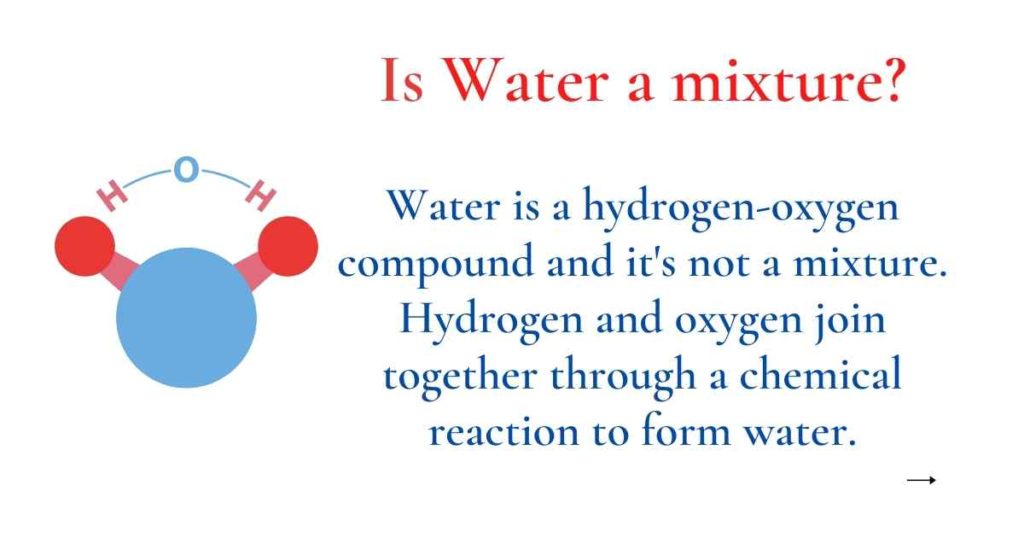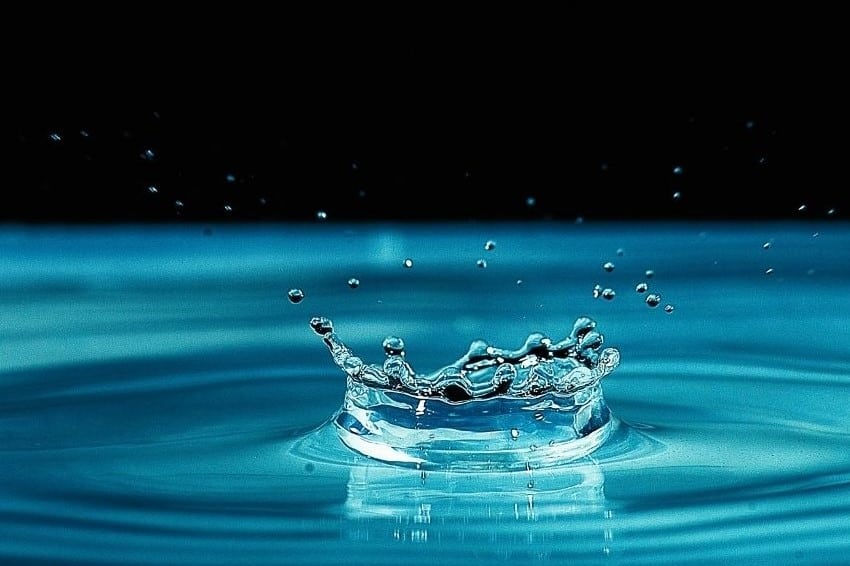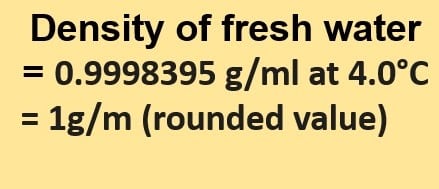Water is not a mixture.
Hydrogen and oxygen are two gases that react to form water when they react chemically. Water is a hydrogen-oxygen compound, it’s not a mixture. In simple terms, hydrogen and oxygen join together through a chemical reaction to form a new substance called water.

Table of Contents
Why Water is not a Mixture of Hydrogen and Oxygen?
To answer the question “Is water a mixture?”, we need to understand what mixtures are.
Mixtures are substances made up of two or more types of matter. Physical methods can be used to separate them. Examples include a salt-water mixture, a sugar-water mixture, various gases, air, and so on.
In water, two hydrogen atoms chemically combine with one oxygen atom to form a new substance with properties distinct from either hydrogen or oxygen alone. As a result, water is not a mixture; it is a compound and a single substance.
Summary
- Water is a chemical compound of hydrogen and oxygen.
- Water is not a mixture.
- Mixtures are substances made up of two or more types of matter, which can be separated.
Related Topics
Water Cycle
Why Does Oil Float on Water?
Dynamic Viscosity-An Overview
Is Carbon Dioxide a Pure Substance?
Thermal Energy Equation- Simple Overview
Frequently Asked Question
Some of the frequently asked questions are given below
1. What is thermite welding?
Thermite welding is a type of welding that involves reducing metal oxides with aluminum powder and releasing a large quantity of heat. A thermite reaction is used to repair railway rails or broken machine components.
2. At what temperature does water freeze?
Water’s normal freezing and melting points are 0 degrees Celsius or 32 degrees Fahrenheit.
3. What is the specific heat of water?
The Specific heat formula is the amount of heat supplied to the specimen, divided by the resulting temperature increase. cp is related to the unit mass of the specimen. The mathematical form of the formula is Q/m ΔT = cp where Q refers to the amount of heat supplied to the specimen and ΔT is the rise in temperature. Check the full article Specific heat of the water.
4. What is the weight of water in kg?
At 25°C (77°F or 298.15K), the weight of water is 1 gram per cubic centimeter or 1,000 kilograms per cubic meter. This means that the density of water is 1000 kg/m3. Weight per cubic foot: 62.4 pounds per cubic foot [lb/ft3], or 0.58 ounces per cubic inch [oz/inch3].
5. What is weathering?
Weathering is the process by which rocks on the Earth’s surface break down or dissolve. Weathering is a natural process that breaks down and removes material from the coast. Exposure to the elements causes surfaces to deteriorate over time.
6. What is the density of water in lbft3?
Density is a physical property that expresses the mass per unit volume. In the case of liquid water, the density of water is close to 1000 kg/m3, though it varies slightly depending on temperature. The density of water lb/ft3 is 62.428 lb/ft3.
7. Is boiling water a chemical change?
At one atmosphere of pressure, the boiling point of water is 100 °C or 212 °F (sea level). The value, however, is not constant. The boiling point of water is affected by atmospheric pressure, which varies with elevation.
8. What is portable water?
Water fit for human consumption is defined as potable water (i.e., water that can be used for drinking or cooking). The term implies that the water is both safe and drinkable.
Non-potable water is water that is unfit for drinking but, depending on its quality, can be used for a variety of other purposes.
9. Is burning wood a chemical change?
Burning wood is a chemical change in which wood is converted into carbon dioxide, water vapors, and ash in the presence of heat and oxygen.
10. What is the surface tension of water?
Surface tension refers to the ability of a liquid’s surface to resist an external force because of its molecules’ cohesion. At 20 °C (68 °F), the surface tension of water is 0.07275 joules per square meter.
11. What is the thermal conductivity of water?
Thermal conductivity is a property of materials that indicates their ability to conduct heat. The thermal conductivity of water is 0.591 W/mK. It is frequently denoted by the letter ‘k’ or, less frequently, the letter “lambda.” Thermal resistivity is the reciprocal of thermal conductivity.
12. What is the specific gravity of water?
The specific gravity of water is 1 at 4 degrees Celsius because this is the standard value used by scientists to determine the specific gravity of various substances. However, A water sample was taken at a different temperature or pressure, or one that contains impurities has a slightly different specific gravity value.
More Links
The pH of Distilled/ De-Ionized Water
Viscosity of Water
Water Potential
Why is Water a Polar Molecule?
Unit Weight of Water| Specific Weight
- BCl3 Lewis Structure in four simple steps - November 1, 2023
- PH3 Lewis Structure in four simple steps - October 8, 2023
- PF3 Lewis structure in four simple steps - September 24, 2023



